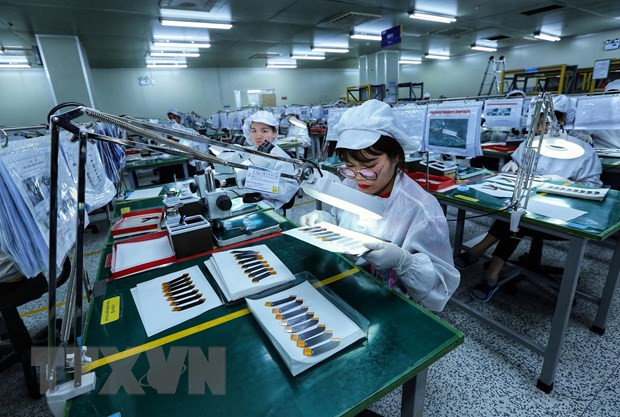 Economy
Economy


|
| A production line Yên Phong Industrial Zone in Bắc Ninh Province. VNA/VNS Photo Danh Lam |
HÀ NỘI — The European Chamber of Commerce in Việt Nam (EuroCham) on Tuesday unveiled the Q3 2025 edition of its Business Confidence Index (BCI), showing a renewed surge of optimism among European firms operating in the country.
The index climbed to 66.5, surpassing pre-tariff levels and reaching its highest point in three years, demonstrating resilience and adaptability amid global headwinds and evolving US tariff pressures.
“This steady confidence is particularly striking in a world defined by volatility and uncertainty – where the ripple effects of geopolitics, technological shifts and climate change are rewriting trade and investment strategies across continents,” said EuroCham Chairman Bruno Jaspaert.
The BCI Q3 2025 report, conducted by Decision Lab, goes beyond macroeconomic sentiment to capture structural shifts quietly reshaping Việt Nam’s business environment: forward-looking reforms in visa and work permit policies, growing momentum for green investment and the ongoing digitalisation of administrative procedures. Together, these changes reflect how European investors perceive Việt Nam’s future: full of promise yet not without friction.
The shifting trade landscape is beginning to leave its mark. As the US implements new tariff measures and global supply chains realign, 31 per cent of surveyed businesses reported a net negative impact on their financial performance, up from 15 per cent in Q2 2025. The share of firms seeing a net positive impact also rose, from 5 to 9 per cent, reflecting potential gains for companies able to reposition themselves amid global trade re-routing.
Despite these adjustments, relocation remains limited: only 3 per cent are considering moving operations out of Việt Nam, while another 3 per cent are considering relocating into or within the country, reaffirming Việt Nam’s reputation as a resilient and reliable base for production and investment.
While clarity around US 'transshipment' rules and future trade deals remains limited, most firms report no major changes to their investment plans or operations. Regulatory compliance, market dynamics and sourcing strategies have become 'slightly more challenging,' but few see these headwinds as strong enough to alter their long-term commitment to Việt Nam.
Chairman Jaspaert said: “The pressures are now materialising, but they remain proportionate to our earlier findings. What’s remarkable is the leap in sentiment: 80 per cent of respondents are optimistic about their prospects over the next five years, and 76 per cent would recommend Việt Nam as an investment destination. It affirms that Việt Nam’s structural story still holds strong.
"The recent upgrade of Việt Nam’s stock market classification by FTSE Russell – from Frontier to Secondary Emerging Market status – underwrites the findings of our BCI survey. It signals growing confidence from international investors and recognises Việt Nam's rising importance as an investment destination for future business.”
This renewed confidence aligns with Việt Nam’s broader economic ambitions. Nearly half of respondents (42 per cent) believe that Việt Nam will reach its ambitious GDP growth target of 8.3–8.5 per cent for 2025, while 23 per cent remain neutral and 35 per cent express some reservations. The General Statistics Office’s most recent data – reporting GDP in Q3 increased by 8.23 per cent year-on-year – underscores Việt Nam’s robust momentum.
Decision Lab CEO Thue Quist Thomsen said: “While neutrality still dominates in the short-term outlook, sentiment becomes distinctly more positive when firms discuss the future. Notably, 68 per cent expect economic stabilisation and improvement in the next quarter, up 18 percentage points since Q2 2025 – a clear indication that businesses are expecting to close the year on a stronger footing.”
The Q3 2025 BCI ultimately reaffirms Việt Nam’s position as one of the most promising destinations for European investment in Asia. As the world grows more volatile and unpredictable, optimism must be anchored in continued reform and resilience. Respondents consistently stress that Việt Nam’s long-term competitiveness depends on regulatory predictability, consistency across provinces and efficient administrative procedures. — VNS




